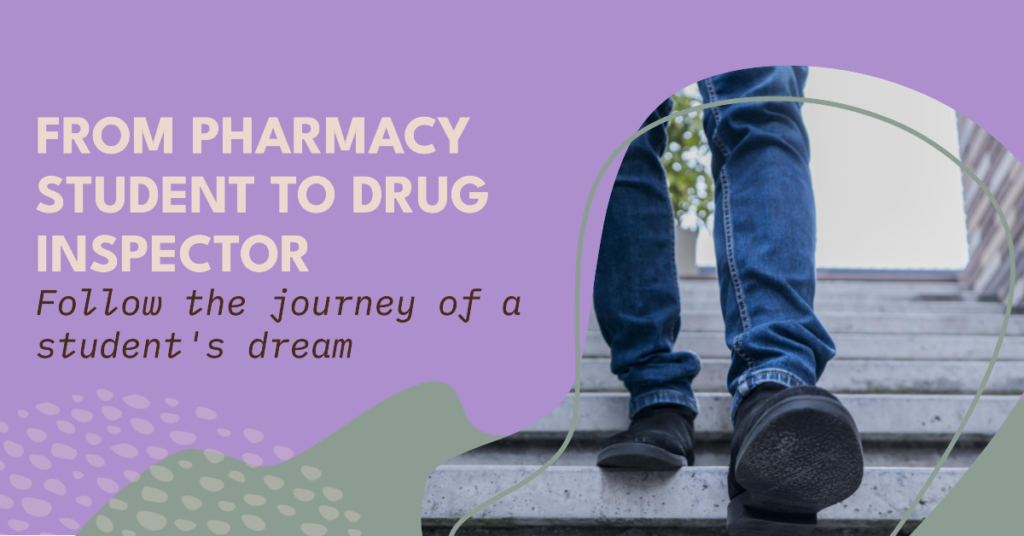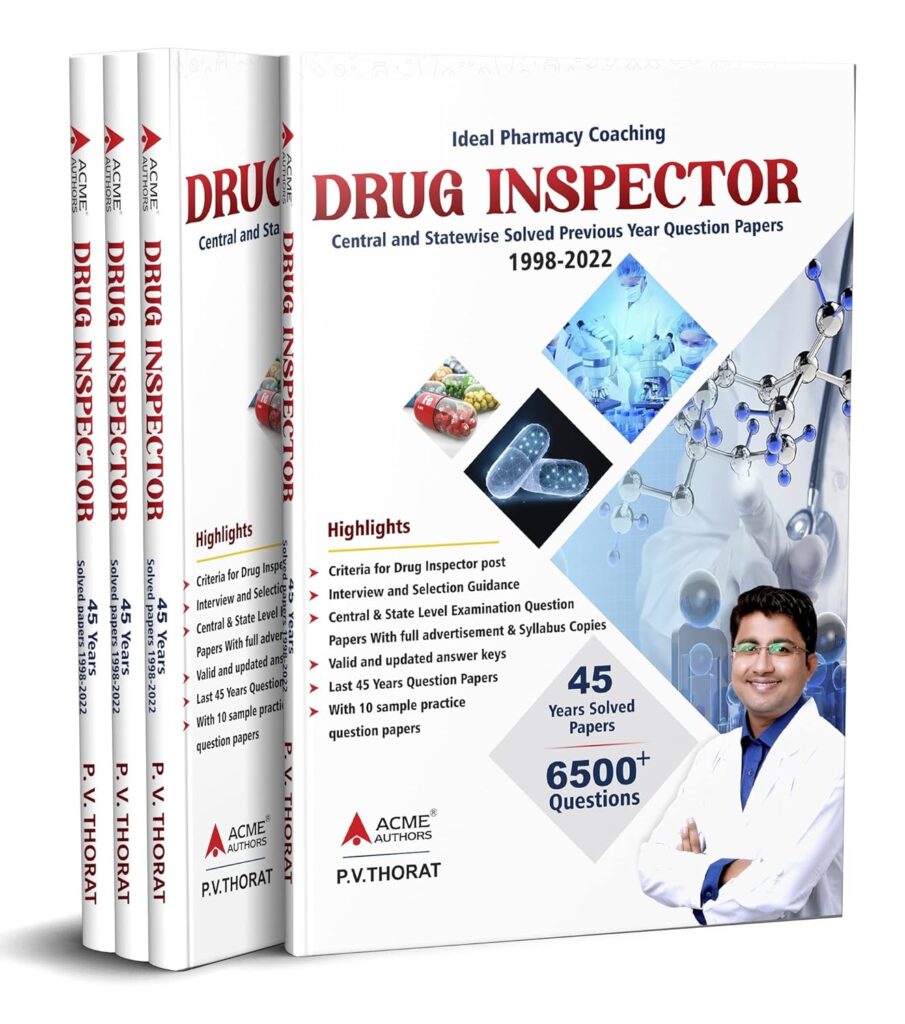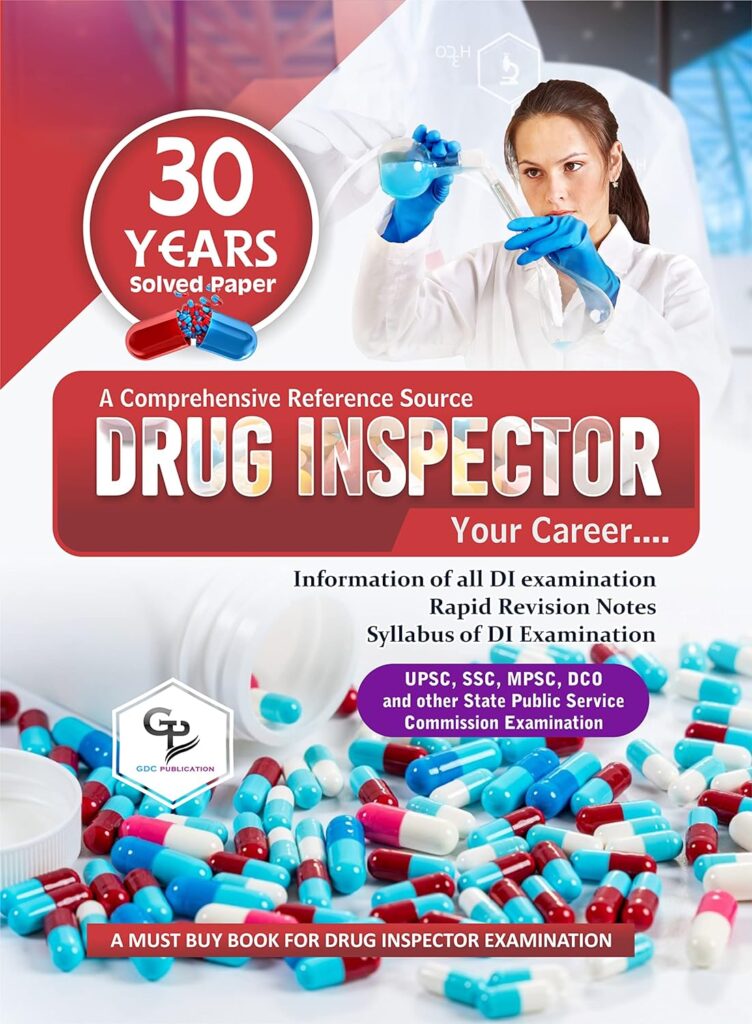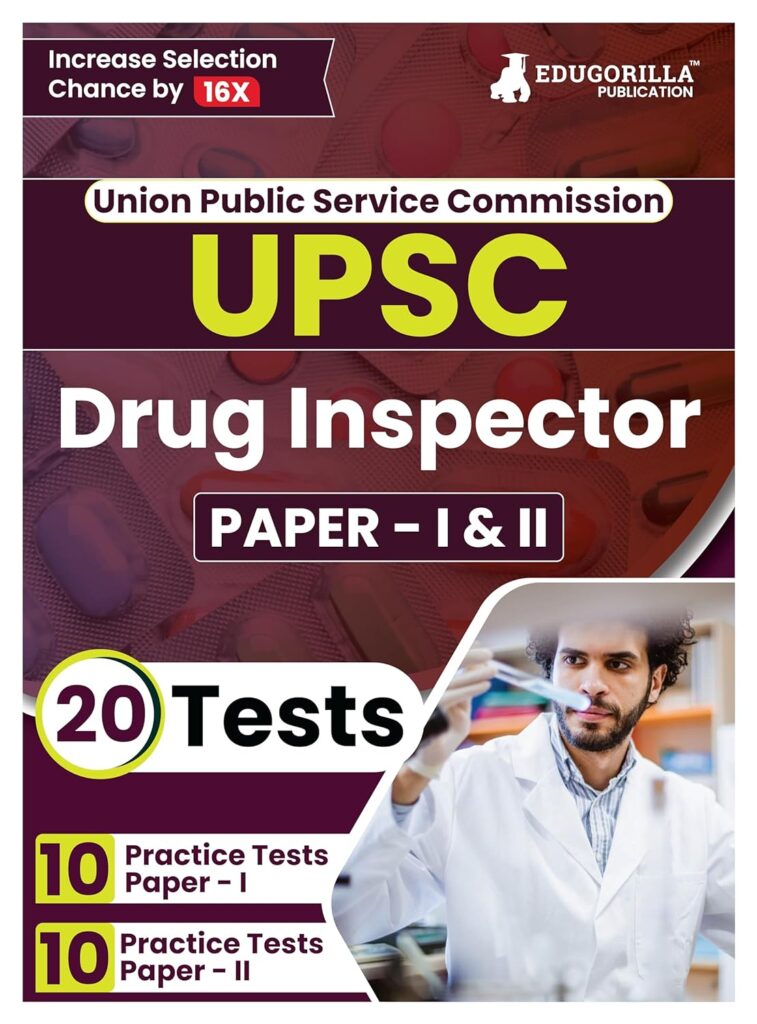Dreaming of a career as a Drug Inspector in India? Discover the qualifications, skills, and powers needed with our comprehensive guide. Dive into detailed syllabi and get ready for exams. Your journey to How Do I Become a Drug Inspector ? starts here.
Table of Contents
Introduction- Drug Inspector
Inspector means
- An inspector appointed by the central or state government in relation to Ayurvedic, Siddha, or Unani drugs; and
- An inspector appointed by the central or state government in concerning any other drug or cosmetics.
- Drug Inspectors are considered civil servants and are officially subject to the subordinate authority. A Drug Inspector is a pharmaceutical specialist who is an expert in the monitoring and maintenance of the efficiency, safety, quality, and usefulness of medicines from the production phase to the sales phase. Drug Inspector is the dream of almost every pharmacy professional and to achieve this goal requires dedication and hard work.

Qualification or Eligibility criteria for Drug Inspector
Educational Qualification
Graduation or Bachelor’s degree in Pharmacy or Pharmaceutical Sciences or Medicine with specialization in clinical pharmacology or microbiology from a recognized university.
How Do I Become a Drug Inspector ?- Courses for eligibility
Bachelor of Pharmacy (B. Pharm)- 4 years course
Pharm.D (Doctor of Pharmacy)- 6 years course
Experience
- Minimum experience of 18 months with the manufacturing of at least one of the substances referred to in Schedule C OR
- Minimum experience of 18 months in the testing of at least one of the substances stated in Schedule C in an approved testing laboratory OR
- Experience obtained should be equal to three or more years in the inspection of companies manufacturing any of the drugs referred to in Schedule C throughout their service as drug inspectors.
Age Eligibility
- Candidate minimum age- 21 years
- Candidate maximum age- 30 years
- 5 years of relaxation is given to the candidate belonging to the reserved category (maximum 35 years). Please consider that age, as well as educational eligibility criteria, may vary per different state rules and respective departments & institutions.
How Do I Become a Drug Inspector ?- Skills Required
- The candidate himself needs to be disciplined, self-confident, absolute obedience to excellence in the pharmacy industry.
- Candidate should have good knowledge of salts, formulations, active pharmaceutical ingredients, and good manufacturing practices.
- Candidate must have adequate knowledge of pharmaceutical jurisprudence.
- Candidates should be experts at conducting experiments, tests, and analysis to determine the future quality and effectiveness of various drugs.
- Candidate must have excellent communication skills, patience, with fluency at speaking English, Hindi, and regional languages.
- Drug Inspector Salary, Perks, Allowances
How Do I Become a Drug Inspector ?- Salary, Perks, and Allowances of a Drug Inspector
Drug Inspector gets paid according to the Level-8 PayScale, after implementation of the 7th pay commission Drug Inspector will get a salary between INR 47,000 to INR 1,51000. After selection, the Selected candidate will be appointed as Group B Gazetted Officer. The candidate will get a salary of 47,600 along with Dearness Allowances (DA) and other allowances.
Salary structure, pay scale may vary between state and central government as per different rules and laws.
How Do I Become a Drug Inspector ?- Powers of the Drug Inspector
Powers of the Drug Inspector are tremendous. Below mentioned powers will surely boost your desire for “How to become a drug inspector”.
Power to Inspect
- Inspection of premises where medicinal products or cosmetics are manufactured and of means for standardization and testing of medicinal products or cosmetics.
- Inspection of sites for storage, dispense, or sell for sale or delivery of medicines or cosmetics.
- Inspect all places in association with the manufacturing, selling, or delivery of drugs or cosmetics where offenses have been performed.
Power to Examine Every Document
Inspection or review of any register, log, document, or other material items relevant to any individual or any place of manufacturing or processing, procurement, or distribution and may seize it if the proof of an offense is likely to be submitted.
Power to Collect Sample for Test & Analysis
- Sample collection from the person who transports, produces or supplies this medicine or cosmetic product to the consumer or receiver of the medicine or cosmetic product.
- Inspection of vehicles, carriages, containers, or other transport facilities used for the transport of medicines or cosmetics, about which an offense was committed.
Power to Seize Drugs or Cosmetics
- Seizure of the stock of such medications, cosmetics, or properties that are involved in the fraud.
- Written order to prohibit a person owning a drug or a cosmetic product from disposing of drug stocks for a defined time of no longer than 20 days or to resolve the suspected breach by the owner of the drug or cosmetic product a flaw.
How Do I Become a Drug Inspector ?- Duties of Drug Inspector
Inspection of the premises licensed for Sale
- Inspecting at least once in a year, all facilities permitted to sell drugs in the area allocated to it and make sure that the licensing conditions must be followed and in strict accordance with the law.
- Seize, procure the drug stock, and send samples of the drug for test and analysis from and standard laboratory.
- Investigate the complaint made to him in writing concerning any unlawful manufacturing, procurement, purchase, or sale and begin prosecution in violation of the Act or Code of Law.
- Maintain documentation of all inspections and raids, including prescription sampling and warehouse seizure, and send copies and complete records to the governing authority.
- Conduct the requisite investigations and inspections to identify a breach of the law, the selling of drugs.
- If authorized by the state government, drug inspectors will take imported packages suspected of possessing drugs into detention and are prohibited from being imported.
Inspection of manufacture of Drugs and Cosmetics
- All the premises approved to manufacture, purchase and dispense the medicines in the area allocated to this area should be inspected at least once a year and the Inspector should check that the licensing requirements and the legislation and the regulations are being strictly followed.
- In the case of companies approved to manufacture drugs in compliance with Schedule C or C1 for inspecting the manufacturing plant, means of standardization and testing of the substance, methods and location of storage, staff qualifications employed, and information on location, configuration, and management of the facility that may affect the quality and/or efficiency of the product.
- After each inspection under which the terms and law requirements of license and regulations are complied with sending a detailed report to the governing authority.
- To carry out criminal proceedings if the infringement of law is found.
How Do I Become a Drug Inspector ?- Steps to follow !
Here are the stepwise guide for “How do I become a drug inspector ?”.

- The first step is to pass 10+2 with physics, chemistry, biology/mathematics as the core subjects.
- Now, apply for a Bachelor’s degree in Pharmacy, graduation in pharmacy is the most essential criterion to apply for the Drug Inspector post. Many states, as well as central institutes, also organize entrance examinations for admission to the B.Pharm courses.
- In some states or examinations, 18 months of experience in manufacturing and testing of drugs listed in Schedule C is necessary. So, gain experience in any manufacturing company or drug testing laboratory for 18 months.
- If your age is between 21-30 years, then you are eligible to apply for the post of Drug Inspector. Age qualification may vary as per the respective state governing body or law.
- Drug Inspector exams are being conducted by UPSC (Union Public Service Commission) and SPSC’s (State Public Service Commission) as per the vacancies available in the state or central departments.
- UPSC and state PSCs inform candidates about vacancies by releasing notification on their website.
6 Months Roadmap for “How Do I Become a Drug Inspector”?
Month 1-2: Foundation Building
- Week 1-2: Research the drug inspector exam format and syllabus.
- Week 3-4: Gather study materials, including recommended books and online resources.
- Week 5-6: Focus on strengthening your foundation in pharmaceutical sciences and regulatory affairs.
Month 3-4: Intensive Study
- Week 1-2: Dive into specific subjects outlined in the syllabus.
- Week 3-4: Start solving practice questions and previous exam papers.
- Week 5-6: Join online forums or discussion groups for clarifying doubts and sharing insights.
Month 5: Practical Exposure
- Week 1-2: Seek internships or part-time roles in pharmaceutical or regulatory settings.
- Week 3-4: Apply theoretical knowledge to real-world scenarios.
- Week 5-6: Reflect on practical experiences and how they relate to exam topics.
Month 6: Revision and Exam Simulation
- Week 1-2: Review all subjects, emphasizing weak areas.
- Week 3-4: Simulate exam conditions by taking practice tests with time constraints.
- Week 5-6: Fine-tune exam strategies, focus on time management, and stay updated on any last-minute changes.
Remember to maintain a healthy balance between study and relaxation, and adapt the plan according to your progress and preferences. Best of luck with your drug inspector exam preparations!
- Weeks 5–6: Consider how real-world encounters connect to the subjects covered in the exam.
Week 1-2: – Month 6: Exam Simulation and Revision Go over each subject again, focusing on
NOTE– The syllabus given below includes common subjects. For a specific syllabus and exam pattern, please follow the syllabus approved by the respective examination authority (UPSC/State PSCs) in their notification or guidelines.
Drug Inspector Exams, Pattern, Syllabus
Drug Inspector Exam Pattern
Below is the updated pattern for “How Do I Become a Drug Inspector ?

Detailed Syllabus-How Do I Become a Drug Inspector ?
Human Anatomy & Physiology
How Do I Become a Drug Inspector ?- Introduction to the human body, Structure of cell, its component, and their functions, Elementary tissues of the human body, Osseous system- skeleton system, Classification of joints, Haemopoietic System, Lymphatic System, Cardiovascular System, Respiratory System, Nervous System, Digestive System, Urinary System, Endocrine System, Reproductive System, Sense Organs, Skeletal Muscle, Sports Physiology.
Pharmaceutics
How Do I Become a Drug Inspector ?- Introduction to dosage forms, Prescription, Posology, Historical background and development of the profession of pharmacy, Development of Indian Pharmacopoeia, Weight and measures, Powders, and Granules, Monophasic dosage forms, Biphasic dosage forms, Suppositories and pessaries, Galenical, Pharmaceutical calculations, Surgical aids, Incompatibilities.
Biochemistry
How Do I Become a Drug Inspector ?- Introduction to biochemistry, Enzymes, Carbohydrate metabolism, Lipid metabolism, Biological oxidation, Protein and amino acid metabolism, Nucleic acid metabolism, Introduction to clinical chemistry, The kidney function test, Liver function test, Lipid profile Test, Immunochemical techniques, Electrolytes.
Pharmaceutical Organic Chemistry
How Do I Become a Drug Inspector ?- Structure and physical properties, Nomenclature of organic compounds, Free radical chain reactions of alkane, Alicyclic compounds, Nucleophilic aliphatic substitution mechanism, Dehydrohalogenation of alkyl halides, Electrophilic and free radicals addition, Carbon-carbon double bond as substituents, the theory of resonance, Electrophilic aromatic substitution, Nucleophilic addition reaction, Mechanism of aldol condensation, Claisen condensation, Cannizzaro reaction, crossed aldol condensation, crossed Cannizzaro reaction, benzoin condensation, Perkin condensation. Knoevenagel, Reformatsky reaction, Wittig reaction, Michael addition, Hoffman rearrangement, Nucleophilic aromatic substitution, Oxidation-reduction reaction.
Pharmaceutical Inorgnic Chemistry
How Do I Become a Drug Inspector ?- Errors, Volumetric analysis, Acid-base titrations, Redox titrations, Nonaqueous titrations, Precipitation titrations, Complexometric titrations, Theory of indicators, Gravimetry, Limit tests, Medicinal gases, Acidifiers, Antacid, Cathartics, Electrolyte replenishers, essential trace elements, Antimicrobials, Pharmaceutical aids, Dental products, Miscellaneous compounds, Radiopharmaceuticals.
Pharmacognosy and Phytopharmaceuticals
How Do I Become a Drug Inspector ?- Introduction, Definition, history, and scope of Pharmacognosy, Classification of crude drugs, Cultivation, collection, processing, and storage of crude drugs, Detailed method of cultivation of crude drugs, Study of cell wall constituents and cell inclusions, Microscopical and powder Microscopical study of crude drugs, Study of natural pesticides, Detailed study of various cell constituents, Carbohydrates and related products, Detailed study carbohydrates containing drugs, Definition sources, method extraction, chemistry and method of analysis of lipids, Detailed study of oils, Definition, classification, chemistry, and method of analysis of protein, Study of plants fibres used in surgical dressings and related products, Different methods of adulteration of crude drugs.
Pharmacology
How Do I Become a Drug Inspector ?- General Pharmacology, Pharmacology of drugs acting on ANS, Pharmacology of drugs acting on the cardiovascular system, Pharmacology of drugs acting on Central Nervous System, Pharmacology of Drugs acting on Respiratory tract, Pharmacology of Hormones and Hormone antagonists, Pharmacology of autocoids and their antagonists, Pharmacology of drugs acting on Blood and blood-forming agents, Pharmacology of drugs acting on Renal System, Chemotherapy, Immunopharmacology, Principles of animal toxicology, The gene, genome structure, and function.
Pharmaceutical Analysis
How Do I Become a Drug Inspector ?- Quality assurance, Chromatography- column chromatography, TLC, PC, Ion-exchange chromatography, HPLC, HPTLC, Gas Chromatography, Electrophoresis, Gel filtration, and affinity chromatography, Electrometric methods, Spectroscopy, Flame photometry, Atomic Absorption spectroscopy, NMR and ESR, Mass Spectroscopy, Polarimetry, X-Ray Diffraction, Thermal Analysis.
Pharmaceutical Jurisprudence
How Do I Become a Drug Inspector ?- Pharmaceutical Legislation, Drugs, and Cosmetics Act-1940, and its rules 1945, Pharmacy Act-1948, Medicinal, and Toilet Preparation Act-1955, Narcotics Drugs and Psychotropic substances Act-1985 and Rules, Study of Salient Features of Drugs and magic remedies Act and its rules, Study of essential Commodities Act Relevant to drugs price control Order, Drugs Price control Order and National Drug Policy, Prevention of Cruelty to Animals Act-1960, Patents and design Act-1970, Brief study of prescription and Non-prescription Products.
Medicinal Chemistry
How Do I Become a Drug Inspector ?- The modern concept of rational drug design, Anti-infective agents, Sulphonamides and sulphones, Antimalarials, Antibiotics, Antineoplastic agents, Cardiovascular agents, Hypoglycemic agents, Thyroid and Antithyroid agents, Diuretics, Diagnostic agents, Steroidal Hormones and Adrenocorticoids.
Pharmaceutical Formulations
Formulation of Tablets, Capsules, Liquid orals, Parenteral, Ophthalmic preparations, Controlled, and Novel drug delivery system.
Hospital Pharmacy
Hospital- it’s Organization and functions, Hospital pharmacy- Organization and management, The Budget- Preparation and Implementation, Hospital drug policy, Hospital pharmacy services, Manufacture of Pharmaceutical preparations, Continuing professional development programs, Radio Pharmaceuticals- Handling and Packaging, Professional relations and practices of hospital pharmacist.
General Knowledge
How Do I Become a Drug Inspector ?- General Knowledge is the most important section of any exam, this may act as a major deciding factor in the examination. Detail, dedicated, and focused study of the fields given below may help the candidate to score better:
International Organizations, Banking and Insurance, Geography, Books and Awards, Everyday Science, Awards and Honours, Economy, History, Economics, Constitution, Politics, Current Affairs, Computer Knowledge, Polity and Governance, Culture, Countries and Capitals, Dates and Committees, Spor
Mental Ability
How Do I Become a Drug Inspector ?- Analogy, Classification, Series, Coding-Decoding, Direction Sense Test, Logical Venn diagrams, Alphabet test, Sitting arrangements, Mathematical Operations, Arithmetical Reasoning, Inserting the Missing Character, Number, Ranking and time sequence test, Eligibility Test.
MCQs

How Do I Become a Drug Inspector ?- Books

How Do I Become a Drug Inspector ?- Books

How Do I Become a Drug Inspector ?- Books

Frequently Asked Questions- How Do I Become a Drug Inspector ?
Can I be a drug inspector after pursuing a Pharm.D?
Certainly! After completing a Pharm.D., you can pursue a career as a drug inspector. Armed with comprehensive pharmaceutical knowledge, you’ll play a crucial role in ensuring drug safety and compliance. Your Pharm.D. background will uniquely equip you to contribute to public health by inspecting and regulating pharmaceutical products.
What should I do to become a drug inspector after earning my BPharm?
Embarking on a career as a drug inspector after earning your BPharm involves taking strategic steps. Begin by gaining relevant experience in the pharmaceutical industry. Focus on regulatory affairs and quality control roles to enhance your understanding. Further, consider pursuing postgraduate qualifications in regulatory affairs or pharmaceutical sciences. Engaging in internships or training programs with regulatory agencies can also bolster your credentials. Keep abreast of industry developments and regulatory changes to stay well-prepared for the role of a drug inspector.
What is the qualification for drug inspector?
Becoming a drug inspector typically requires a degree in pharmacy, pharmaceutical sciences, or a related field. In many cases, a Bachelor of Pharmacy (BPharm) or a Pharm.D. (Doctor of Pharmacy) is the minimum educational requirement. Additionally, some regions or countries may have specific licensing or certification exams that aspiring drug inspectors need to pass to demonstrate their knowledge and competence in pharmaceutical regulations. Gaining practical experience in the pharmaceutical industry, especially in areas such as quality control or regulatory affairs, can also be beneficial in qualifying for a role as a drug inspector. Always check the specific requirements of the regulatory authorities in the jurisdiction where you intend to work.
What book should we prefer for a drug inspector exam?
You can definately find a detailed answer to this questions in above article with proper syllabus guide with referring books.
Is an MPharm required to be a drug inspector?
No need for a full MPharm! A BPharm or Pharm.D. is your ticket to becoming a drug inspector. Dive into real-world experience, stay savvy with regulations, and nail those exams. Your passion for pharmacy is the key to ensuring safe and effective medications for everyone!
Can final-year B.Pharm students apply for a drug inspector post without much experience?
Absolutely! Final-year B.Pharm students can apply for drug inspector roles, though experience is a plus. Showcase your academic prowess, eagerness to learn, and any relevant projects or internships. Your passion for pharmaceuticals can outweigh experience, making you a promising candidate for this impactful role.
What are perks of being a drug inspector?
Being a drug inspector comes with perks that go beyond the office. You play a vital role in ensuring the safety of medications, impacting public health. The job offers a sense of responsibility, constant learning, and the satisfaction of contributing to a healthier society. It’s not just a career; it’s a calling.
Can I become Drug Inspector after completing M.Pharm ?
Absolutely! Completing a B.Pharm is a solid foundation for a career as a drug inspector. Focus on gaining relevant experience, staying updated on pharmaceutical regulations, and consider any required certifications or exams. Your B.Pharm sets the stage for a fulfilling journey into the world of drug inspection.
Is a D.Pharm eligible for a drug inspector?
While requirements vary, a D.Pharm (Diploma in Pharmacy) alone may not be sufficient for a drug inspector role in some regions. Typically, a Bachelor of Pharmacy (BPharm) or higher degrees like Pharm.D. are preferred. Check specific job postings or regulatory guidelines to understand eligibility criteria and consider additional qualifications or certifications to enhance your candidacy.
Can a MBBS graduate be a drug inspecter?
In many regions, drug inspector positions primarily require a pharmacy-related qualification, such as a Bachelor of Pharmacy (BPharm) or similar. While an MBBS graduate (Doctor of Medicine) has a strong medical background, the specific pharmaceutical and regulatory knowledge acquired through pharmacy education is often preferred for drug inspector roles. Check local regulations and job requirements for precise eligibility criteria.
What is a drug inspector?
A drug inspector is a regulatory professional responsible for ensuring the safety, efficacy, and quality of pharmaceutical products. They inspect manufacturing facilities, review product documentation, and enforce compliance with pharmaceutical regulations. Drug inspectors play a crucial role in safeguarding public health by ensuring that medications meet established standards and regulatory requirements.
Is an MPharm required to be a drug inspector?
No, an MPharm (Master of Pharmacy) is not always required to become a drug inspector. In many cases, a Bachelor of Pharmacy (BPharm) or Pharm.D. can be sufficient. However, specific requirements may vary by region and regulatory authorities. Gaining relevant experience, staying informed about pharmaceutical regulations, and passing required exams are crucial steps in pursuing a career as a drug inspector.
Is a drug inspector job temporary?
The nature of a drug inspector job varies by region and employing agency. In many cases, drug inspector positions are permanent roles within regulatory bodies or health departments. These professionals play a crucial and ongoing role in ensuring the safety and compliance of pharmaceutical products. However, specific terms of employment can vary, so it’s advisable to check with the relevant regulatory authority or employer for precise details about job permanency.
What are the steps after 12th to become a drug inspector?
After completing your 12th grade education, start your career as a drug inspector! Select science courses, enroll in a BPharm program, and acquire practical experience. Keep abreast of rules, think about doing graduate work, and get ready for regulatory tests. Your love of pharmacy will lead you to protect the public’s health.
How many times can I take the drug inspector test in India?
The number of attempts for the drug inspector test in India can vary. Generally, there is a limit on the number of attempts, but it depends on the specific examination and the regulations set by the regulatory authority conducting the test. Check the official notification or guidelines for the particular exam you’re interested in to find accurate information on the maximum attempts allowed. Currently 30 years is the maximum age for a general category and OBC category student and 35 years for SC-ST category student.
Do we have an interview for a drug inspector posting?
Absolutely! Drug inspector recruitment process include an interview process for drug inspector selection criterion,
Does a drug inspector need to qualify for the GPAT?
No, not required. You can directly apply after your Bachelors in Pharmacy degree.
How Do I Become a Drug Inspector ?- Past Year MCQs
Reference- 1. N.K. Jain, A Textbook of Forensic Pharmacy, publisher- Vallabh Prakashan, Eighth revised edition, 202008,
Reference- 2. Pharmacy Council of India, New Delhi, Rules & regulations